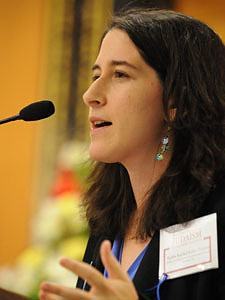Taking time to celebrate our accomplishments allows us to see how far we have come and to plan with enthusiasm for the future. Parshat Ki Tavo envisions a time when the Israelites are living in the Promised Land and are experiencing the blessings of prosperity that they could only dream of during 40 years of wandering. The way that the Israelites appreciated and celebrated their harvest at that time provides a model for marking our accomplishments today, particularly the strides we make in repairing the world.
When the Israelite farmers brought their first fruits—bikkurim—to the Temple at harvest time, they each recited a standard declaration before the priest. This declaration, known as mikra bikkurim in the Mishnah, is familiar to many of us from the Passover seder. Beginning with the phrase “My father was a fugitive Aramean,” it briefly recounts the story of the Exodus: the population explosion that threatened the Egyptians, the misery of slavery and the Divine miracles that set the Israelites free.[1] It is a narrative of struggle, ending with victory: “God brought us to this place and gave us this land, a land flowing with milk and honey.”[2]
Why tell the story of the Exodus at the time of the bringing of the first fruits? It would be easy enough to just plow ahead, celebrating the harvest as a human accomplishment. But the retelling insists that the farmer must also take the time to thank God for the miracles of the past and the gift of the land. Hearing the Exodus story also enables the Israelites to reflect back on how far they’ve come, recognize the gifts of the present and lay a course for the future.
After contextualizing the harvest with the Exodus story, the farmer is commanded to celebrate with his community—including the landless Levite and the stranger, who had no direct role in the production of the harvest and produced no bikkurim themselves.[3] Celebration, we learn from this, should not be self-centered, but should radiate outward to include the disenfranchised and the vulnerable. The inclusion of the stranger is especially noteworthy because his or her ancestors would not have been part of the collective “we” of the mikra bikkurim.
As an activist, I think it is important to apply the model of the bikkurim celebration—an inclusive moment of rest and reflection—to my own work. About 18 months ago, I experienced a major victory in the campaign against U.S.-sponsored torture. On his second day in office, President Obama signed a series of executive orders outlawing various tactics of the United States in the war on terror. I had been fighting for this victory throughout the 2008 American election, and as I watched the President sign the orders alongside a group of retired military generals who were working on the same cause, I nearly cried. How often as an activist do you achieve one of your major goals? Sometimes they seem as far away as the coming of the Messiah. Though I knew there was much more work to be done, I stopped, smiled and said shehecheyanu.
As global justice advocates, we often lose sight of tangible moments of victory in the pursuit of a distant final goal, forgetting to ground ourselves in the small successes of each day and to reflect upon how far we have come. Sometimes I describe my work as a human rights activist as “tilting at windmills” for a living, aiming for world-changing goals that seem unreachable in this lifetime, without acknowledging that there are times when the mark is hit.
Celebration helps us to rest, reflect, recognize and reorganize. It allows us to catch our breath and to identify the tangible results of our struggles: our justice bikkurim. Next, we see our work in its historical context, both for us as individuals (“How did I get here?”) and as a justice community. We also recognize our community, looking into the faces of those who worked alongside us and marveling at how wonderful it is that all these amazing people have dedicated themselves to repairing the world. As we connect, we can see whether there are faces missing from the table, and, like the farmer inviting the stranger and Levite to his celebration, we can invite those who have been excluded to celebrate with us and to become our partners for the future.
Finally, celebration is a time to reorganize, asking ourselves, “What comes next?” Just as the farmer, after thanking God for the “land flowing with milk and honey,” would have begun thinking of the next year’s harvest, so too we must look to the future and prepare our next steps.
[1] Deuteronomy 26: 5-8.
[2] Deuteronomy 26: 9.
[3] Deuteronomy 26: 11.

